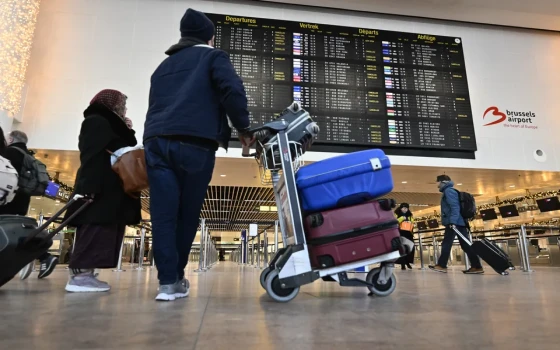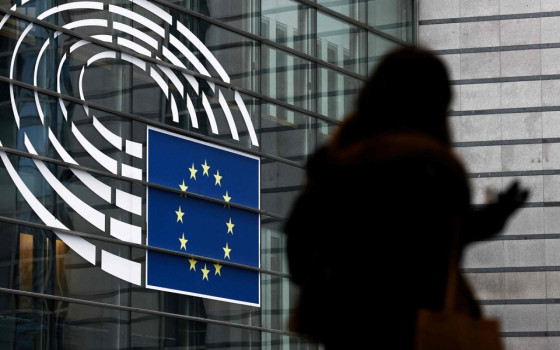The European Parliament is discussing amendments to the Migration Pact as border crossings drop by 35%. Four million people entered and left the EU in one month, including three million foreigners.

- Europe and Arabs
- Wednesday , 12 November 2025 9:53 AM GMT
Brussels: Europe and the Arabs
The European Parliament's two-day session begins today in Brussels, with migration topping the agenda. Commissioner Magnus Brunner is leading the discussion on this issue. Debates are continuing in Parliament on a proposal for a return regulation, even though the entire Migration Pact is scheduled to enter into force on July 1, 2026. According to Playbook, the European edition of Politico, the focus will be on how the Pact, agreed upon in December 2023, will be implemented. The Commission has released a new mini-package, including some key milestones. Among the documents announced by the Commission, which MEPs will discuss today, are:
1) Its first annual report shows a 35% decrease in border crossings. However, problems remain, including the ongoing challenge of accommodating refugees who have fled the war in Ukraine.
2) A proposal to the Council of the European Union to create a so-called "Solidarity Group," designed to ensure a fairer distribution of responsibility in dealing with the pressures that migration can cause. Under this mechanism, countries could choose to accept resettled migrants, pay a fee for each person they refuse, or provide other forms of assistance.
3) Decisions on which EU countries are eligible for assistance and which will be required to provide it. Countries are categorized into several groups: those currently experiencing severe migration pressure; those facing "serious migration situations"; and those at risk of pressure in the coming year. While Parliament has no say in the final decision on these classifications, lawmakers will debate them today, providing a detailed assessment of how capitals are responding.
The size of the proposed Solidarity Fund—and the amount a country would have to pay to opt out of resettlement operations—remains unclear. The figures are confidential under the rules of the Migration Pact, but are expected to be leaked once capitals receive them. More in my article here.
Italy refuses to accept asylum seekers under the Dublin Regulation, which stipulates which country should process asylum applications (usually the person's first point of entry into the EU). Some countries—notably Belgium and the Netherlands—want Rome to resume fulfilling its obligations. "Italy will have access to the Solidarity Fund, but it also has to respect the other party's obligations under the Pact," said Brunner, speaking at a press conference on Tuesday.
The Commission also revealed plans to deploy drones. To help countries facing migration pressures, a €250 million appeal is currently underway for drone and counter-drone projects at external borders.
According to the news site, there was a time when describing migration as “illegal” was viewed with disapproval—the European Parliament even urged EU institutions and member states in 2009 to use the term “undocumented” instead. Those days are over. “All member states feel the pressure of illegal migration,” Brunner said on Tuesday, using the term repeatedly.
Members of the European Parliament may attack the Commission’s decision to scrap the highly sensitive mini-migration package on a day when everyone was absent. Brunner faced the press on Tuesday afternoon—a public holiday in Belgium—after giving them only 30 minutes to arrive. Fewer than 10 journalists—including a representative from Playbook—attended in person, while others joined remotely. And yet again, they’ve done it again: it’s not the first time migration files have arrived quietly, unmonitored. The list of "safe" countries for return was released on April 17—the Thursday before Easter—with less attendance.
"We're not sneaking around, we're just busy!" When asked about the timing, a Commission official cited a "busy agenda" ahead of the meeting. "There was no intention of sneaking in here," the official said, emphasizing the need for transparency before parliamentary debate.
The package was due to be presented by October 15. "We gave ourselves some flexibility to make sure we succeeded," the same official said, noting that it was the Commission's first attempt at such a process. Statement by Commissioner Magnus Brunner on the annual Migration Management Session
“We are on the path to the biggest ever reform of EU asylum and migration policy,” said Commissioner Brunner in a statement. “With today’s proposal, we are completing another element of the Pact on Asylum and Migration. The Pact is not perfect, and we have added some missing elements at the beginning of this mandate with our proposals on returns, the concept of a safe third country, and the list of safe countries of origin. With these reforms, we are regaining control over what happens in the EU. These reforms are absolutely necessary given the growing frustration and the feeling that our rules are being ignored. We need to rebuild trust – between Member States and between EU citizens. This is precisely the essence of the reform: to rebuild trust and regain control. And we are seeing this happening in real time. Almost a month ago, we successfully launched the EES system in all 29 Schengen Area Member States. In this first month, we have already registered more than 4 million entries and exits, and almost 3 million third-country nationals. Thanks to the EES system, we know who is entering the EU, when, and where.” It is the digital backbone of our migration and asylum reform.
Today, we are taking another important step along this path with the launch of our first annual Migration Management Course.
Let me first talk about the report.
The momentum is in our favor: irregular crossings into the EU have decreased by 35% this year.
This is the fruit of the work we have done with our international partners – working on migration routes beyond our borders.
This approach is working, and we must continue with it.
The report also shows that Member States are making good progress towards implementing the Pact by June of next year, and we will support Member States to ensure everyone is ready by then.
Now, let me talk about the launch of the annual Migration Management Cycle.
It is the fruit of the work of many experts here in Berlaymont and in national capitals as well.
It is the starting point for a European, fact-based approach to migration.
An approach that ensures no EU country is left to face overwhelming pressure alone.
Everyone will benefit, in one way or another, from the Pact.
With today's proposal, we ensure that responsibility and solidarity go hand in hand—a harmony that lies at the heart of the Pact.
With the Solidarity Mechanism, we will have a balanced support system.
Member States will decide on their contributions.
Today's proposal includes identifying who will benefit from solidarity in the first cycle.
It follows the methodology set out in the Pact.
Overall, I would say that the results reflect three main trends.
First, the pressure of irregular crossings along the Mediterranean routes. Secondly, the support provided by Member States to Ukraine, in the form of temporary protection. Thirdly, we are working to strengthen our preparedness for Member States facing challenges in their reception systems or at risk of migration being weaponized.
But let me be clear: all Member States are feeling the pressure of irregular migration in its various forms.
Today's proposal is only one part of the reforms under the Pact.
Our focus must now be on keeping arrivals low.
Intensifying the return of those without the right to remain.
Adopting new return rules and implementing the principles of safe country of origin and safe third country.
Building partnerships with third countries that align with the EU's strategic interests.














No Comments Found